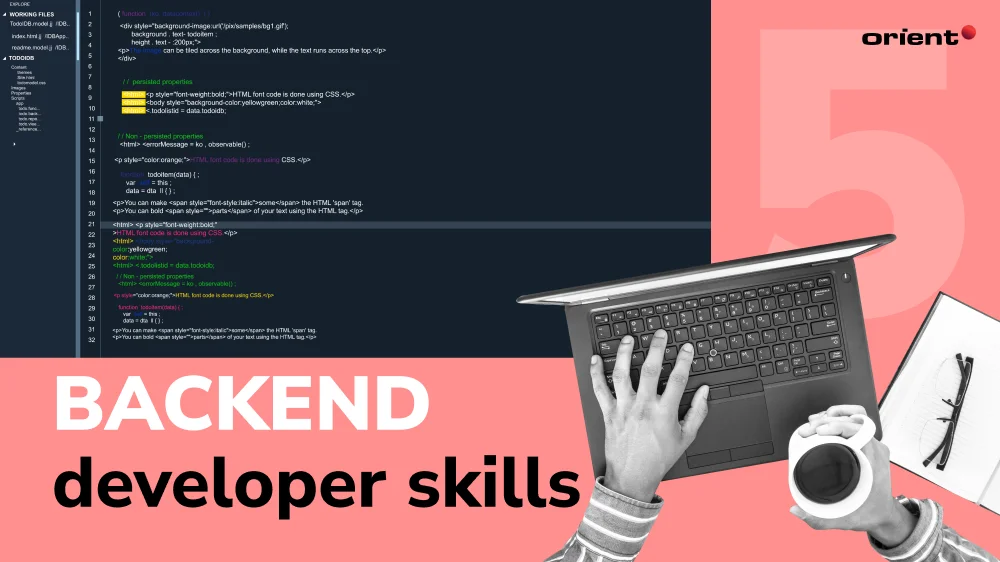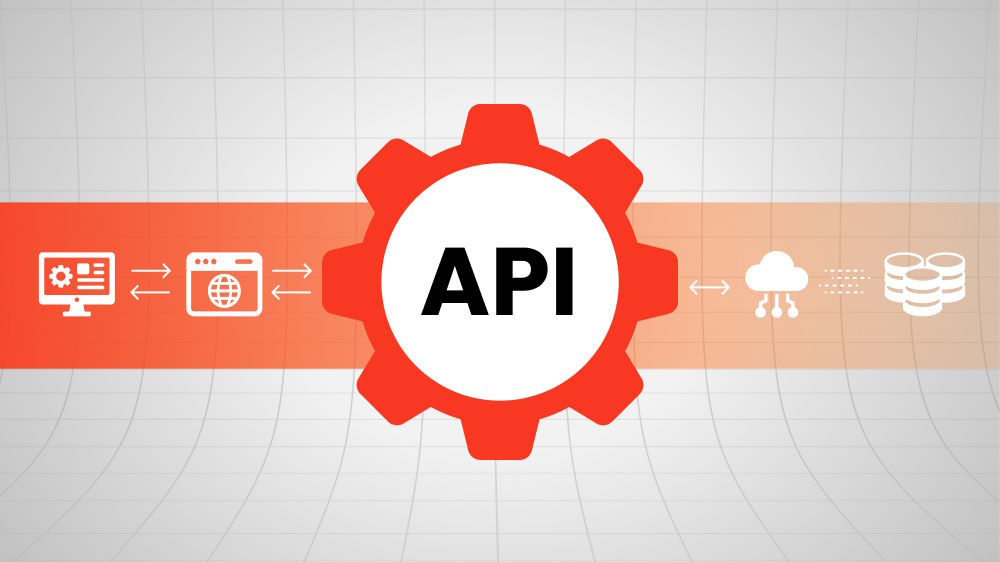5 Backend Developer Skills You Need to Learn Today

Content Map
More chaptersAs the architects of the digital world, backend developers create the robust foundation upon which applications operate. According to the US Bureau of Labor and Statistics, the profession of backend development is expected to grow by an impressive 13% by 2028, outpacing the average growth rate for all other occupations.
This surge in demand is driven by the growing complexity of the digital ecosystem and the need for scalable, efficient, and secure systems. But what does it take to thrive in this pivotal role? What are the key backend developer skills that will differentiate you in the competitive landscape of backend development?
Luckily, this field guide reveals the top skills empowering backend wizards like never before. Ready to take your power level to the next plane? From mastering server-side programming languages such as Python, Java, Ruby, and Node.js to understanding database management and system architecture, these skills will set you apart in the competitive tech industry. Adventure calls - turn the page and level up!
What Are Backend Developers’ Responsibilities?

The world of web development and software may appear seamless on the surface, but a complex ecosystem runs beneath the user interface. Backend developers are the silent heroes behind the scenes, crafting the core functionalities that power these applications. Their responsibilities encompass a wide range, ensuring everything runs smoothly and efficiently.
The key responsibility of a backend developer is to build and optimize the server-side logic that underpins the application. This encompasses a vast array of tasks, from designing and implementing database schemas to crafting secure and scalable RESTful APIs. Backend developers are the architects who meticulously plan and construct the foundational layers that support the application’s functionality, from authentication and authorization to data processing and storage. Backend developers choose the appropriate database type, create efficient data structures, and write queries to retrieve and manage this data effectively.
On a typical day, a backend developer might find themselves delving into the intricacies of a programming language like Python or Node.js, writing maintainable and clean code that adheres to best practices. They may also be tasked with integrating third-party services and APIs, ensuring seamless communication between the various components of the application. Troubleshooting and resolving issues related to performance, security, or scalability are also common responsibilities, as backend developers work tirelessly to ensure the backend infrastructure remains reliable and resilient.
Beyond the technical aspects of their role, backend developers often collaborate closely with their counterparts, such as frontend developers; hence, their undeniable qualities are problem-solving skills and communication skills. Backend development may also engage with other team members like product managers, designers, and other stakeholders to understand business requirements and translate them into robust technical solutions.
Essential Backend Development Skills

Mastering the art of backend development requires a diverse skillset that equips you to build robust and scalable web applications. Here, we’ll delve into five fundamental pillars of backend development:
Proficiency in Backend Programming Languages
At the core of backend development is the ability to write clean, efficient, and maintainable code. As a backend developer, mastering one or more programming languages is crucial. Popular choices in the industry include Python, Java, Ruby, and Node.js, each with its own unique strengths and applications.
Python, for instance, has gained widespread popularity for its simplicity, readability, and extensive library ecosystem, making it a versatile option for tasks ranging from web development to data analysis. Java, on the other hand, is renowned for its enterprise-level scalability and cross-platform compatibility, making it a go-to language for large-scale, mission-critical applications.
To truly excel as a backend developer, it’s important to not only be proficient in a specific language but also to have a solid grasp of programming fundamentals, such as data structures, algorithms, and object-oriented programming principles. Continuous learning and practice are key, as the landscape of web technologies is constantly evolving, and staying informed with the latest trends and best practices is essential for delivering cutting-edge solutions.
Understanding Databases and Data Management
Databases are the lifeblood of modern web applications, serving as the repository for storing and retrieving critical data. As a backend developer, a deep understanding of database concepts and the ability to design, implement, and manage efficient data storage solutions are indispensable skills.
Exploring both relational and non-relational (NoSQL) databases is crucial. Relational databases, such as MySQL, PostgreSQL, and Oracle, excel at handling structured data and enforcing data integrity through the use of tables, rows, and columns. Non-relational databases, like MongoDB and Cassandra, on the other hand, are better suited for storing and processing semi-structured or unstructured data, often in a more scalable and flexible manner.
Beyond mastering the technical aspects of database management, backend developers must also possess the skills to optimize database performance, ensure data security, and develop robust data manipulation and querying capabilities using languages like SQL. Familiarity with database design patterns, indexing techniques, and backup and recovery strategies can further enhance a backend developer’s expertise in this domain.
Web Frameworks and APIs
Web frameworks provide a structured way to build web applications and come with built-in functionalities that save developers time and effort. This saves developers from starting the project from scratch and lets them concentrate on the special features of their program.
There are several popular web frameworks that backend developers should be familiar with. Django is a high-level Python framework that leverages clean, pragmatic design. Ruby on Rails, often just called Rails, is a Ruby framework that is known for its simplicity and productivity. Express.js is a flexible and minimal Node.js web application framework that offers a robust set of features for both mobile and web applications.
Application Programming Interfaces, or APIs, provide communication between various software applications. Backend developers often need to integrate third-party APIs into their applications or develop APIs for their own applications. Understanding how to work with APIs is a crucial skill in backend development.
Knowledge of Server-Side Technologies
Backend developers should be familiar with server-side technologies like Node.js, Apache, and Nginx. Based on the V8 JavaScript engine seen in Chrome, Node.js is a JavaScript runtime. Apache and Nginx are popular web servers that can serve static files, handle dynamic content, and manage HTTP requests.
Backend developers are often responsible for deploying and managing servers. This includes tasks such as setting up the server environment, managing databases, handling traffic, and troubleshooting issues. Familiarity with popular version control systems like Git is also important for managing code and collaborating with other developers.
Security and Performance Optimization
Backend developers are responsible for protecting the application from threats and vulnerabilities. This includes securing the database, validating and sanitizing input, implementing authentication and authorization, and protecting sensitive data.
Backend developers can use various strategies to secure their systems. This includes using secure protocols, encrypting sensitive data, implementing proper error handling, and keeping software and dependencies up to date. Regularly testing and auditing the application for security vulnerabilities is also important.
Performance and scalability are key considerations in backend development. Backend developers need to write efficient code, optimize database queries, and manage resources to ensure the application can handle high traffic and grow with the business. Techniques like caching, load balancing, and asynchronous processing can help improve performance and scalability.
Ways to Enhance Your Skills as a Backend Developer

The world of backend development is constantly evolving. New technologies and frameworks emerge, and best practices are continuously refined. To stay ahead of the curve and become a truly successful backend developer, a commitment to continuous learning is essential. Here are some effective strategies to hone your skills and excel in modern backend development:
- Deepen Your Knowledge of Core Concepts: Master the fundamentals of programming languages, databases, and web development principles. A solid understanding of these essential concepts will serve as a strong foundation for learning new technologies and adapting to the ever-changing landscape.
- Embrace Modern Backend Development Practices: Stay updated on the best practices and latest trends in backend development. Explore topics like microservices architecture, containerization (e.g., Docker), and cloud-based development (e.g., AWS, Google Cloud Platform). These technologies are shaping the future of backend development, and proficiency in them can significantly enhance your skillset.
- Practice, Practice, Practice: The best method to solidify your learning is through consistent practice. Participate in online coding challenges, contribute to open-source projects, or build personal projects that allow you to experiment with new technologies and frameworks. Hands-on experience not only powers your technical skills but also helps you develop problem-solving abilities and gain valuable experience for your portfolio.
- Leverage the Power of Version Control Systems: Mastering a version control system like Git is crucial for any successful backend developer. Git allows you to track code changes, collaborate effectively with other developers, and revert to previous versions if needed. Familiarity with Git is essential for managing development workflows and maintaining a clean codebase.
- Engage with the Developer Community: Immerse yourself in the vibrant developer community. Participate in online forums, attend meetups and conferences, and connect with other backend developers. This interaction allows you to learn from professionals, ask questions, share your knowledge, and stay informed about the latest trends and discussions within the development world.
- Never Stop Learning: The key to success in backend development is a growth mindset and a hunger for continuous learning. Explore online courses, tutorials, and documentation to expand your knowledge base. There are numerous resources available to help you learn new languages, frameworks, and best practices.
By following these strategies and maintaining a dedication to learning, you’ll be well on your way to becoming a skilled and adaptable backend developer who can thrive in the ever-evolving world of modern backend development. Remember, the development process is a continuous journey. Embrace the challenges, celebrate your achievements, and keep pushing yourself to learn and grow as a developer.
Where to Find Skilled Backend Developers
Backend development is a complex field that requires a wide range of skills. From understanding frontend and backend development to mastering technical skills like programming languages, databases, and version control systems, there’s a lot to learn. But with dedication and practice, you can become a proficient backend developer and build powerful, secure, and efficient web applications.
Due to their highly important role in the operation process, hiring skilled backend developers is a crucial task for any business. There are several places where you can find such talent, one of them being Orient Software.
Orient Software is a reputable software development company that houses a team of highly skilled backend developers. With a proven track record of delivering high-quality software solutions, we have established itself as a trusted source of backend development talent.
The backend developers at Orient Software are proficient in a variety of server-side languages, including but not limited to Python, Java, Ruby, and Node.js. We also have a deep understanding of database management, system architecture, and modern backend development practices.
Moreover, Orient Software is not just about providing manpower. We are committed to maximize your project succeed at every stage. Whether you need consultation on the best practices in backend development or assistance in troubleshooting complex issues, Orient Software is ready to help.







